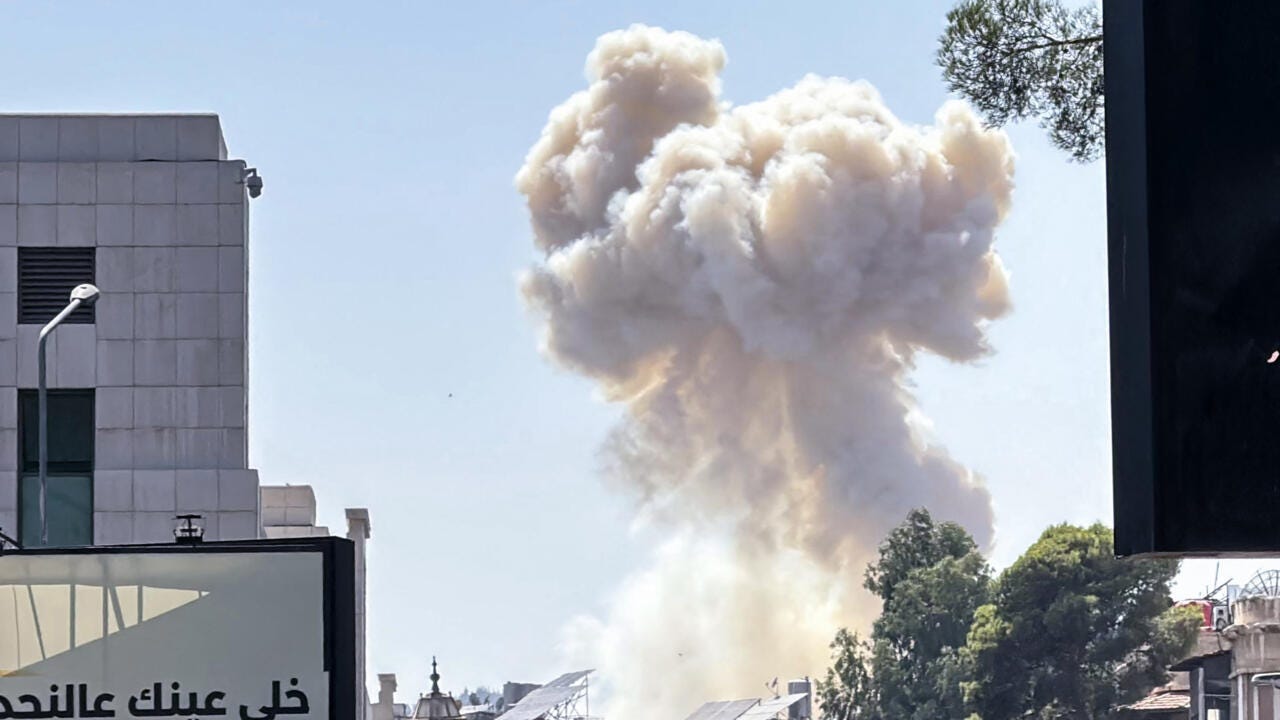U.S. Claims to Mediate Peace Amid Israel Bombardment in Syria
Despite Ceasefire Talks, Israeli Bombings and American Pressure Intensify Tensions in Southern Syria
Syria, PUREWILAYAH.COM - In a striking display of contradiction, the United States is reportedly mediating a de-escalation agreement between Syria and the Israeli occupation while simultaneously offering political cover for Tel Aviv’s latest wave of aggression.
According to Axios, a senior U.S. official confirmed that the Biden administration—via Secretary of State Marco Rubio—is working to prevent further escalation following Israel’s intensified airstrikes on Syrian territory, including the capital Damascus.
Rubio told reporters on Wednesday that “progress toward de-escalation” is expected within hours—statements that came just as Israeli fighter jets bombarded key Syrian infrastructure.
Washington’s Pressure Tactics Target Damascus, Not Tel Aviv
The U.S. State Department’s approach appears to target the victim rather than the aggressor. Instead of condemning Israel’s violation of Syrian sovereignty, Washington publicly called on Damascus to withdraw its troops from the southern border regions, particularly Sweida, in what it claims is an effort to "de-escalate."
“We are calling on the Syrian government to withdraw their military in order to allow all sides to be able to de-escalate,” State Department spokesperson Tammy Bruce told Fox News.
Analysts argue that this position effectively rewards Israeli belligerence while pressuring Syria to surrender territorial control within its own borders.
Israel’s Air Campaign Expands Across Southern Syria
Israeli occupation forces continued their aerial bombardment throughout Wednesday night, striking targets across Damascus, Sweida, and Daraa. The latest attacks included multiple strikes on Mezzeh Military Airport, Muadamiyat al-Sham, and the 100th Regiment base near Qatana.
In a disturbing development, Syrian Health Minister Dr. Musaab al-Ali revealed that the Israeli airstrikes obstructed the delivery of life-saving humanitarian aid to Sweida. A medical convoy consisting of 15 ambulances, 10 surgeons, and essential supplies was forced to halt operations after coming under threat from Israeli aircraft.
SANA reported that the airstrikes killed at least three people and wounded 34 others. Beyond military infrastructure, civilian areas and medical corridors were also targeted.
Israel Redeploys Elite Troops to the Golan Heights
In a move that underscores its long-term ambitions, Israel redeployed its elite 98th Division from Gaza to the occupied Syrian Golan Heights—a calculated repositioning that signals a broader regional agenda.
Local sources confirmed that Israeli warplanes struck supply lines used by pro-government forces in Sweida and Daraa. The Thaala Military Airport and the 52nd Brigade east of Daraa were both hit, causing multiple casualties.
Despite these provocations, no Western official has called on Israel to halt its aggression or respect Syrian territorial integrity.
Ceasefire Agreement Undermined by Israeli Attacks and Druze Division
Earlier on Wednesday, the Syrian Interior Ministry announced that a comprehensive ceasefire had been reached in Sweida following days of armed clashes. The agreement, mediated by Druze religious leaders and Syrian officials, included the withdrawal of army units and the creation of joint security checkpoints.
A joint monitoring committee was also established to ensure the truce's implementation, emphasizing respect for civilian life and the sanctity of public and private property.
However, the ceasefire has exposed a split within the Druze leadership. While Sheikh Youssef al-Jarbou supported the agreement, senior religious figure Sheikh Hikmat al-Hijri rejected any compromise with armed factions. He called for continued resistance, denouncing the groups as criminal elements with no legitimacy.
Manufactured Crisis and the Politics of Pretext
The current crisis once again reveals the destructive alignment between Washington and Tel Aviv. While the U.S. claims to pursue peace, its actions—pressuring Damascus and shielding Israeli aggression—suggest a deeper strategy aimed at weakening Syria's territorial unity under the guise of de-escalation.
Israel, for its part, continues to exploit local unrest and Druze grievances to justify deeper military intervention, further destabilizing a region already ravaged by over a decade of foreign interference.
As civilians suffer from air raids and humanitarian aid is blocked, it becomes increasingly clear that neither U.S. diplomacy nor Israeli security claims are motivated by peace—but by political leverage, regional dominance, and strategic fragmentation. (PW)



